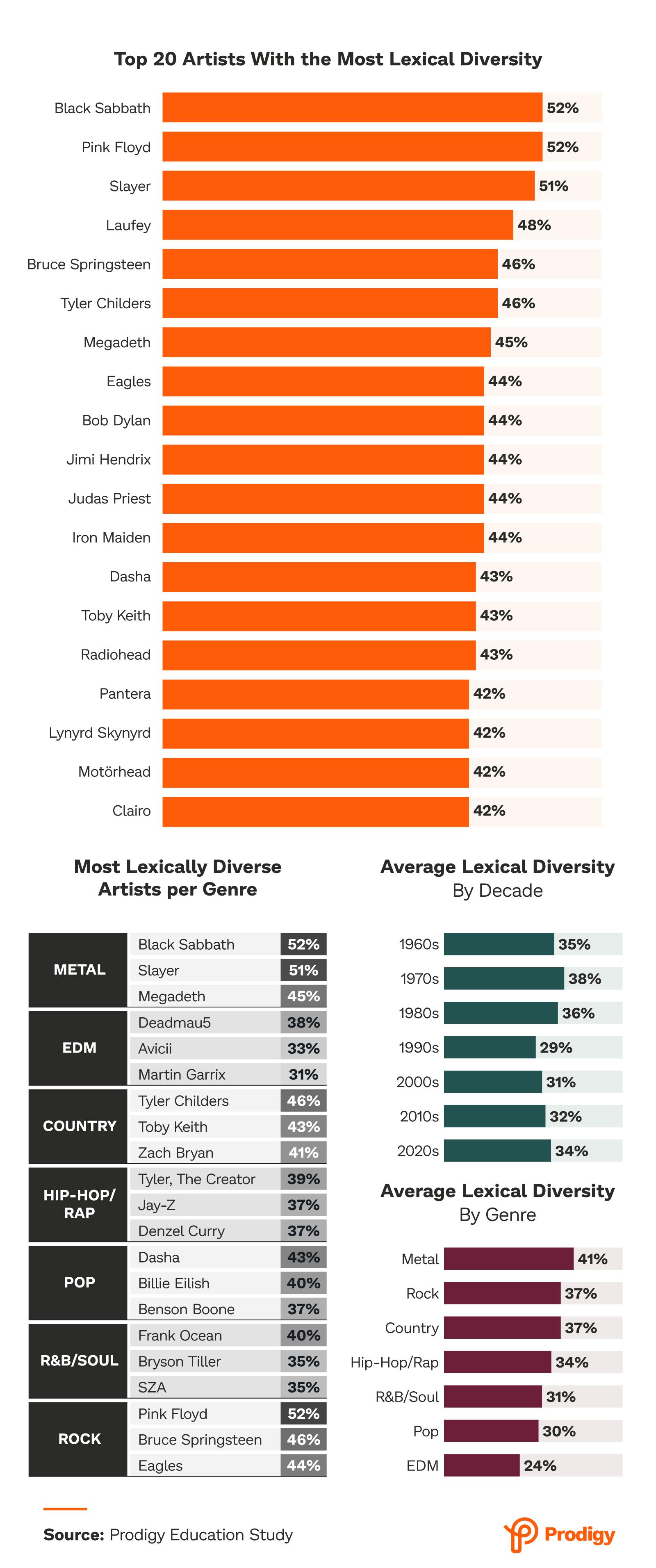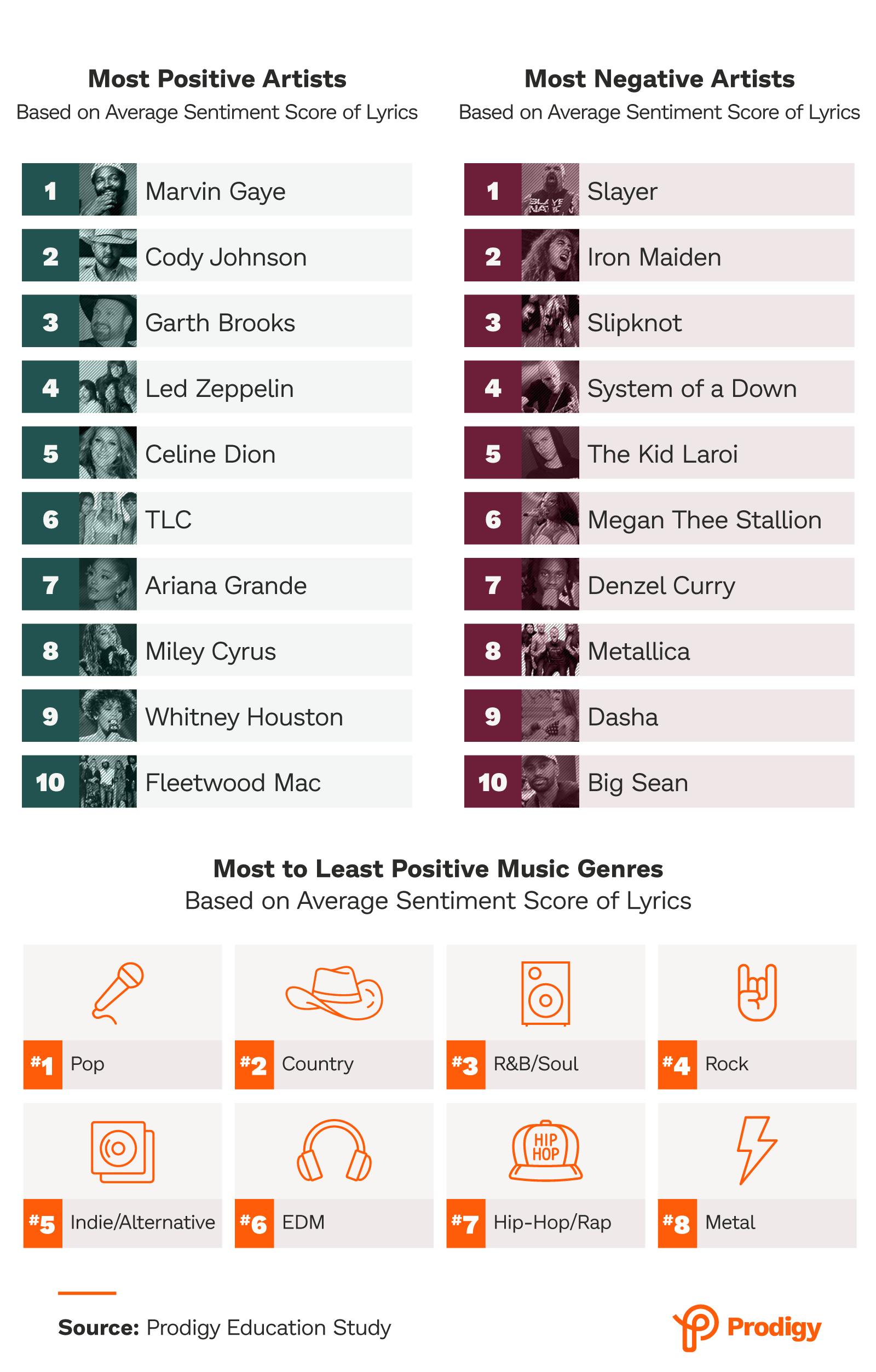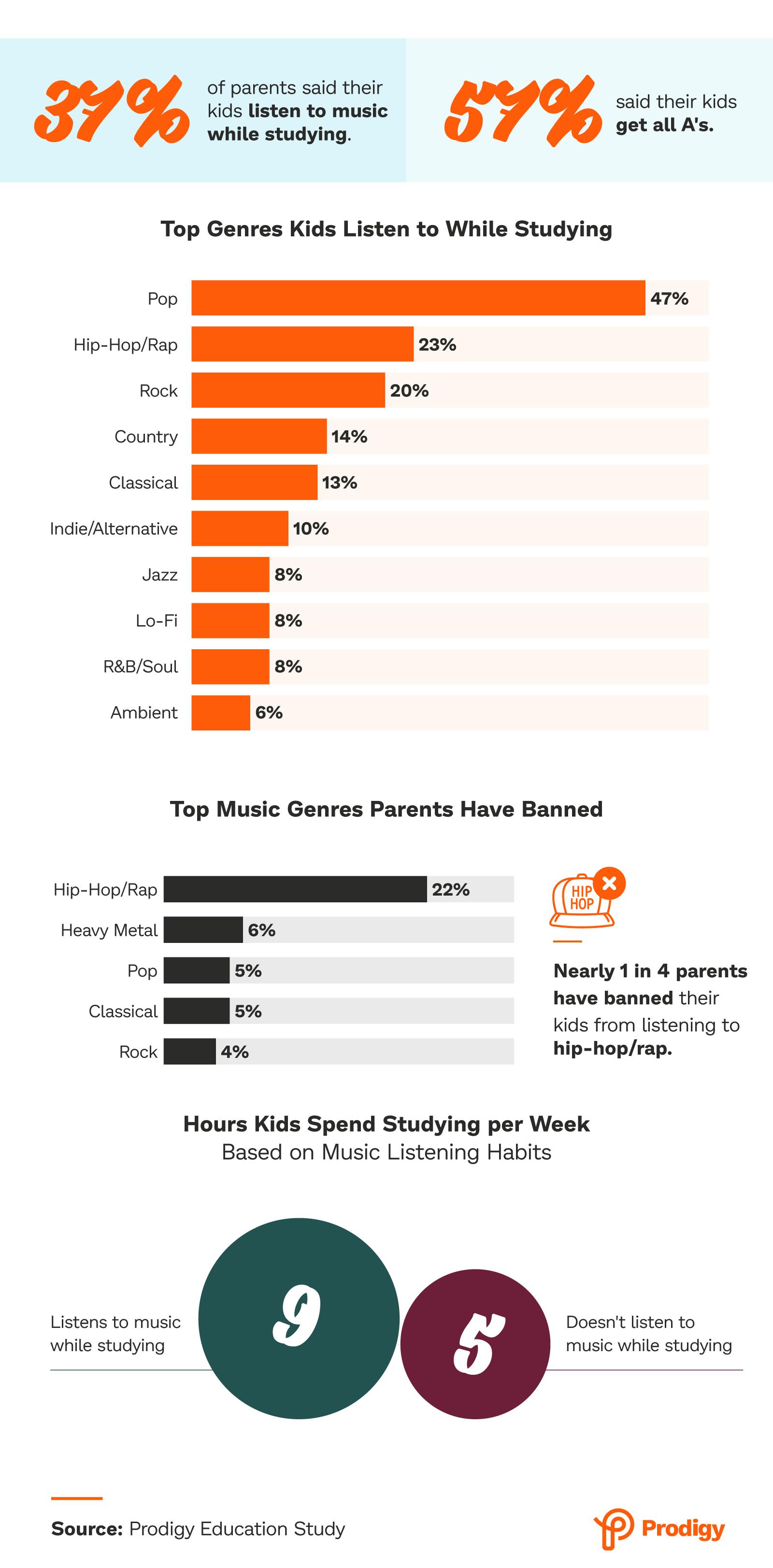The Most Intelligent Music Artists - Prodigy Education

Have you ever wondered how the music you love shapes your productivity, focus – and even learning? This study highlights which artists display the most lyrical genius and shows how music's impact goes far beyond entertainment.
We analyzed the lyrics of top Billboard artists and iconic musicians from past decades to uncover patterns in emotion and complexity. Lexical diversity – the variety of unique words used in an artist's lyrics – helped us determine which artists and genres have the richest vocabulary. We also surveyed music fans to see how their listening habits influence their work performance and how music plays a role in their children's study routines at home.
Key Takeaways
- Black Sabbath is the most intelligent artist, based on the lexical diversity of their song lyrics.
- Metal is the most intelligent genre, based on lexical diversity (41%), but it also has the most negative lyrics.
- Marvin Gaye is the most positive artist, while Slayer is the most negative.
- More than 3 in 5 people who listen to music while working say it improves productivity, and 70% say it enhances focus.
- 37% of parents say their kids listen to music while studying, and more than half (57%) get all A’s.
Understanding Lexical Diversity in Music
In this section, we'll explore the lexical diversity of popular music. The more diverse the artist's vocabulary, the higher the lexical diversity score they received.

Black Sabbath led the charts as the artist with the highest lexical diversity, scoring 52%. When analyzing genres, metal came out on top with an average lexical diversity of 41%, followed by rock and country, both tied at 37%.
Within metal, Black Sabbath was ranked the most intellectual artist, with Slayer in second and Megadeth in third. Looking across decades, music from the 1970s had the highest lexical diversity, with an average of 38%, while the 1990s had the lowest at 29%.
When analyzing word frequency across multiple artists and genres, we found that "love," "know," and "time" were the most popular words. The top 10 most common words in the songs we studied were:
- Love
- Know
- Time
- Good
- Want
- Feel
- Heart
- Night
- Say
- See
Sentiment in Song Lyrics: Positive vs. Negative
Let's now explore the sentiment of artists' lyrics. We measured the emotional tone of songs to see whether the lyrics were generally positive, negative, or neutral.

Marvin Gaye is the most positive artist, with his lyrics reflecting an optimistic and uplifting sentiment. Pop, as a genre, also stood out for its overall positive tone.
While we pinpointed metal as the most negative genre overall, some studies have suggested that metal can be good for mental health. Slayer, known for its darker themes, ranked as both the most negative metal artist and the most negative artist across all genres. Judas Priest, on the other hand, emerged as the most positive metal artist.
Looking at sentiment across decades, songs from the 1960s were the most positive, while songs from the 2000s were the least.
How Music Impacts Productivity and Career Success
We asked people how music affects their work and found some surprising connections between their favorite genres and success on the job. From boosting productivity to helping land promotions, music plays a bigger role in the workplace than you might think.

More than 3 in 5 people who listen to music while working reported that it improves their productivity, and even more – 70% – said it enhances their focus. Among the top genres for working, Lo-Fi/Chillhop (92%) and ambient (91%) music were the most preferred choices.
Our survey also revealed that people who listen to music while working were 70% more likely to have received a promotion and 18% more likely to have received a pay bump in the past two years. Jazz and classical music fans had the most promotions (39% of each group), but reggae and folk fans weren't far behind at 38% each.
Reggae listeners were also the most likely to have received a raise (66%), followed by folk fans (63%). With music setting the rhythm for focus and success, it's clear that the right playlist can be a powerful tool in the workplace.
Music and Study Habits in Kids
We also explored how music influences kids' study habits, revealing their experiences and what parents think. From the genres parents recommend to the ones they ban, music is shaping study time at home.

According to parents, kids who listen to music while studying spend an average of 9 hours a week studying, and over half (57%) are earning all A's. Those who don't listen to music while studying spend less time hitting the books (5 hours/week).
Pop was clearly the most popular genre among kids studying with music on (47%). However, parents believe classical, jazz, and ambient music are the best genres for concentration. On the other hand, 1 in 4 have banned their kids from listening to hip-hop or rap while studying.
Music may help kids study as it has been shown to improve mood, reduce stress, and even stimulate parts of the brain linked to motivation and focus. But keep in mind that while certain genres like classical can enhance cognitive function and memorization, music with lyrics can sometimes distract students and lower their reading comprehension.
The Power of Music Beyond Entertainment
Music can impact how we learn, work, and grow. From boosting productivity at work to helping kids focus while studying, the power of music is undeniable. For students, listening to the right kind of music can enhance focus, reduce stress, and improve study habits. Whether it's instrumental genres that aid concentration or uplifting tunes that inspire creativity, music can help support kids' educational journeys.
Methodology
For this study, we compiled a list of today's top Billboard artists plus popular artists from each decade. We then analyzed the lyrics of 10 songs by each artist to determine sentiment, most common words, and lexical diversity. We used NLTK's VADER analysis tool for the sentiment analysis and Open AI API for the word frequency analysis. We also surveyed 1,000 Americans to explore how music impacts work productivity and kids' study habits.
About Prodigy Education
Prodigy Education is a global leader in game-based learning. Our mission is to help every student in the world love learning, motivating millions worldwide via fun, secure, and accessible curriculum-aligned gameplay experiences. At Prodigy Education, we believe maximizing student motivation helps develop a lifetime love of learning. Prodigy's approach to fun, game-based learning means kids no longer have to choose between homework and playtime. Visit www.prodigygame.com to learn more.
Fair Use Statement
We encourage noncommercial sharing of this content on how music impacts productivity, focus, and learning. If you share it, please include a link back to this page as the original source.






